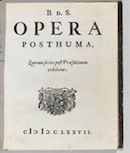
Selection from –Political Treatise - Chapter III, of the right of supreme authorities (Page 2)
Spinoza's Words – (reason dictates that living under law provides greater freedom for the individual)

But (it may be objected) is it not contrary to the dictate of reason to subject one's self wholly to the judgment of another, and consequently, is not the civil state repugnant to reason? But since reason teaches nothing contrary to nature, sound reason cannot therefore dictate, that every one should remain independent, so long as men are liable to passions \ that is, reason pronounces against such independence.
Besides, reason altogether teaches to seek peace, and peace cannot be maintained, unless the commonwealth's general laws be kept unbroken. And so, the more a man is guided by reason, that is the more he is free, the more constantly he will keep the laws of the commonwealth, and execute the commands of the supreme authority, whose subject he is.
If a man, who is led by reason, has sometimes to do by the commonwealth's order what he knows to be repugnant to reason, that harm is far compensated by the good, which he derives from the existence of a civil state. For it is reason's own law, to choose the less of two evils; and accordingly we may conclude, that no one is acting against the dictate of his own reason, so far as he does what by the law of the commonwealth is to be done. And this anyone will more easily grant us, after we have explained, how far the power and consequently the right of the commonwealth extends.